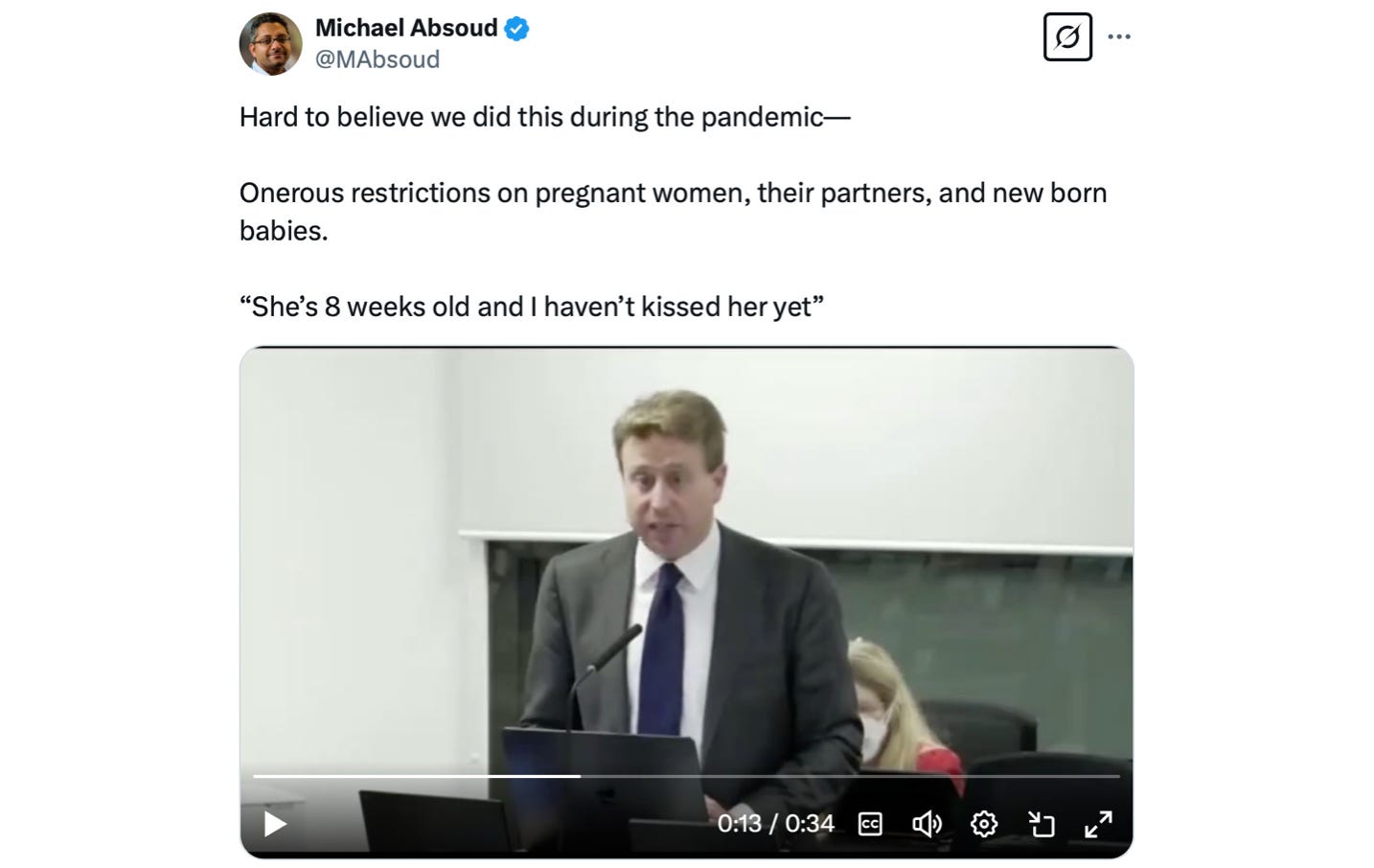Mothering Sunday: let us not forget...
Two short clips as a reminder of what was happening in the UK in 2020
Dear Church Leaders (and everyone else)
Further to this post…
…which was one of my first, and one which I subsequently substantially updated, I have been collating material with a view to writing a follow-up.
But it strikes me that it is often actually not that fruitful to quote doctors and scientists — however eminent. Or to cite scientific papers — peer-reviewed or otherwise. Let alone to point to official government statistics.
And, to be frank, I find writing articles like the one from last March emotionally exhausting. Moreover, it’s not as though I don’t have plenty of other posts in the pipeline to work on…
So, for now at least, I thought I’d simply highlight the two short videos below, featuring accounts of some of what actually happened in the UK in 2020 to pregnant women, their partners and their newborn babies.
It is my hope that, at least to some people, such testimony may speak more powerfully than data. I am grateful to Michael Absoud, a consultant in paediatric neurodisability at Guy’s and St Thomas’ in London, for sharing the clips.
Clip 1 (link)
…care, and contact with babies and impact on families. One woman, whose baby was in the neonatal ward, said PPE made her feel cut off from her baby: “She’s eight weeks old, and I haven’t kissed her yet.”
There were extraordinary and upsetting experiences for many parents, and there seems to have been a failure to consider the wider health consquences of imposing blanket rules such as mask-wearing for new parents in the name of general public health, and at the expense of skin-to-skin contact…
Clip 2 (link)
…failures have left many women and pregnant people traumatised. They led to partners and fathers being wrongly excluded from the first hours, days and weeks with their children. They resulted in unbearable choices, such as…
the parents of neonatal twins who had to choose which parent could visit, and divide the one hour of allocated visiting time between both children
the mother who had to call her partner after emergency surgery to explain that both their babies had died, and, due to poor phone signal, had to decide what to do with the embryos’ remains, alone
and those who simply lost the ability to choose how, when, where and with whom they would deliver their babies
These failures were not merely missed opportunities to provide preferable or ideal care. As the Royal College of Obstetricians and Gynaecologists has identified, some women received maternity services that were “inadequate”.
Devastatingly, some pregnant women died in potentially avoidable circumstances. These errors appear to have been the result of structural failures to pay attention to, prioritise and provide sufficient resources to the safety of pregnant women and people and their babies. And the failures were not quickly identified nor remedied. Visiting restrictions continued to affect pregnant women and people for prolonged periods, including when public restrictions had eased, and even while the public were being encouraged to “eat out to help out”. And so did restrictions on parents being able to spend time with their sick newborn babies in neonatal intensive care.
In the UK. In the 2020s. “For your safety.”
For context, here is the UK Office for National Statistics data for deaths in England and Wales, before “covid measures” were introduced on 23rd March:
Covid had reportedly been circulating since the end of January.
And here are the figures for roughly the same period in 2018, when there were more than 50,000 excess winter deaths:
And yet I don’t recall anyone saying in 2018 that we should do anything out of the ordinary, let alone treat pregnant women — and their partners and their babies — in the ways described above.
I wonder whether one of the most painful things for such people now might be the ongoing reluctance of so many even to acknowledge what has gone on, let alone begin to engage with how and why it happened — not least with a view to ensuring that it never happens again.
And that last point does of course apply much more widely, perhaps not least in relation to our children, as outlined e.g. in this post:
Related:
James Thorp’s book is now available e.g. here:
Dear Church Leaders most-read articles
Some posts, including a version of this one, can also be found on Unexpected Turns
The Big Reveal: Christianity carefully considered as the solution to a problem










![The Day the Dam Broke [2025 re-issue]](https://substackcdn.com/image/fetch/w_140,h_140,c_fill,f_auto,q_auto:good,fl_progressive:steep,g_auto/https%3A%2F%2Fsubstack-post-media.s3.amazonaws.com%2Fpublic%2Fimages%2Fbf808d68-6fb1-487c-bc39-6d80a22a9d2a_990x792.png)

